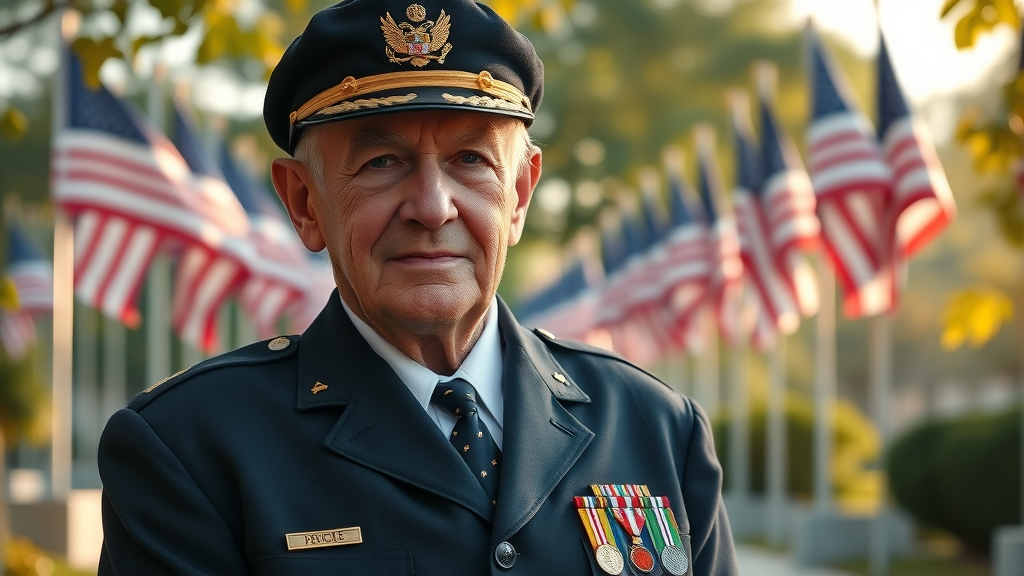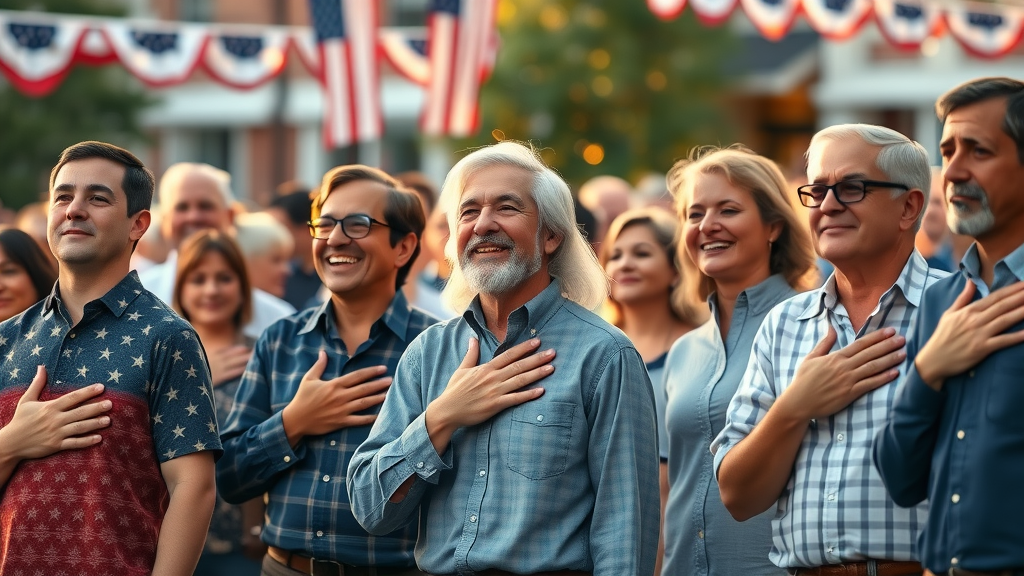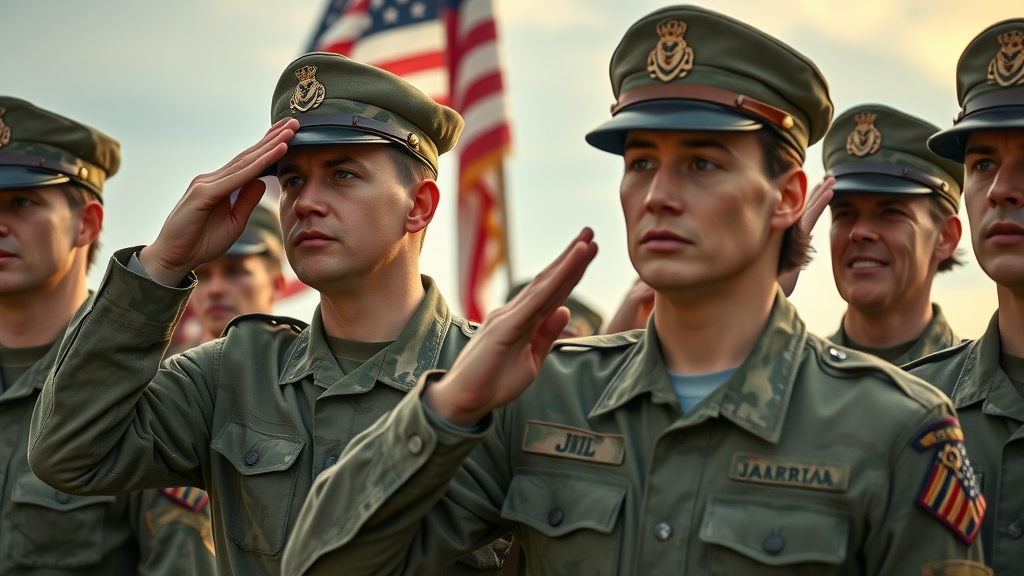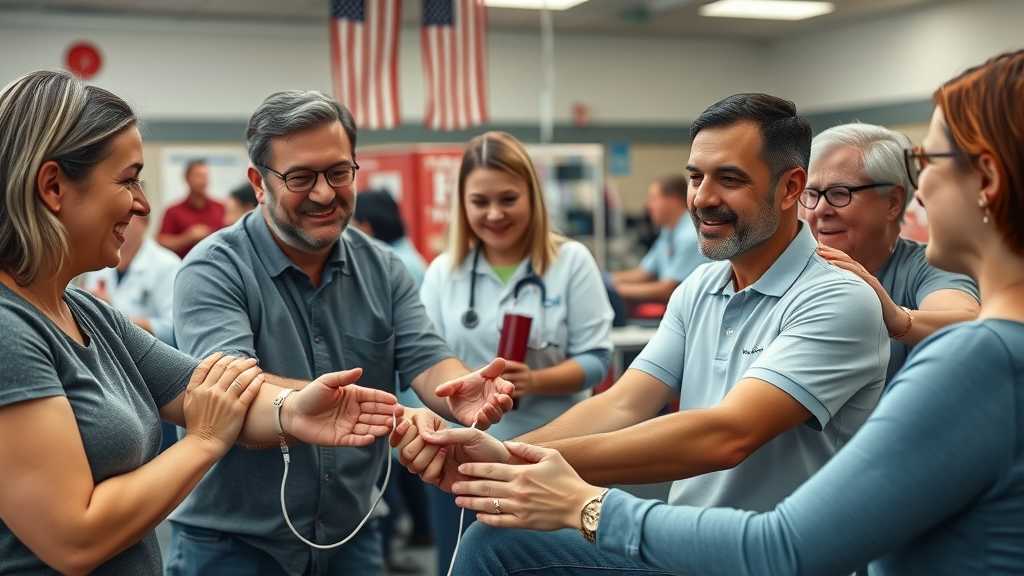What does it mean to fulfill your duty to country ? For many Americans, this question is answered not with lofty words but with simple, powerful actions. Take the story of Robert J. Crump, a U.S. Navy Veteran whose lifetime of service stands as a shining example. From everyday citizens who volunteer at a local food bank, to educators shaping future leaders, there are countless real-world stories that prove patriotism is more than just flag-waving. It's about stepping up, making a difference, and honoring values that shape the United States. Whether you're a student, parent, teacher, or military member, these relatable examples will show how everyone can answer the call to build a stronger nation together.
Robert J. Crump’s Story: A Living Example of Duty to Country
"Serving my country was about honoring the values I was raised with—integrity, responsibility, and a sincere love for America." — Robert J. Crump, U.S. Navy Veteran

The story of Robert J. Crump is one that resonates deeply with anyone curious about authentic duty to country examples . A proud and unbending U.S. Navy Veteran, Robert committed himself not only to the armed forces during his active years but also through his civilian life upon returning home. He is often filled with an emotion for the values that once moved him to enlist—the courage to stand for liberty and freedom, and the belief that being a good citizen starts with personal responsibility.
His service during tense moments echoing the spirit of the American soldier—grimly for the attack, yet always honoring the code of conduct he swore to uphold. Whether assisting his local community or mentoring younger veterans, Robert exemplifies how a sense of obligation does not simply end with discharge. His journey reminds us that our roles as the custodians of American values extend beyond uniforms and formal ceremony. It’s about lending hope when hope seems far away, and helping America remain a rallying point for true greatness.
Defining Duty to Country: What Makes a Citizen’s Obligation Stand Out
To understand duty to country examples fully, it's vital to define what “duty to country” truly means for every American citizen. At its core, it is a set of responsibilities, actions, and attitudes that contribute to the well-being and progress of a nation. It is not limited by age, heritage, profession, or even circumstance. From respecting natural resources to actively engaging in community service, every action plays a part.
The extent of mockery surrounding patriotism often comes from misunderstanding its everyday application. Serving in the armed forces is a classic and noble form, but so is promoting civic education or supporting disaster relief initiatives. The measure isn’t in the grandeur of the act but whether it is done with honesty, pride, and a genuine intent to make the country better for everyone, echoing Robert Crump’s approach and the principles behind the Thayer Award.
What does "duty to country" mean?

“ Duty to country ” means contributing—knowingly and wholeheartedly—to the preservation and advancement of the nation’s ideals, freedom, and community. This encompasses both formal commitments, such as enlisting in the armed forces, and informal participation, like voting or promoting environmental stewardship. It reflects being a good American, mindful of not neglecting the past, and carrying forward an enduring spirit that unites citizens through action.
For many, this duty goes beyond symbolic gestures. It’s rooted in everyday choices and moral integrity: following the law, participating in civic life, and speaking up for civil rights when the situation demands the courage to stand. The heart of the phrase is not allegiance to power but devotion to the values embedded in the United States—liberty, equality, and justice for all.
Everyday Duty to Country Examples You Can’t Miss
-
Voting during local and national elections
-
Volunteering for community improvement projects
-
Serving in the armed forces
-
Respecting and following the law as an American citizen
-
Participating in jury duty
-
Promoting civic education and engagement
Everyday duty to country examples often go unnoticed, but they are the foundation of what makes a thriving nation. Consider an American citizen who votes in every election, believing their contribution matters, defying those who think their voice is insignificant. Or the group of volunteers who beautify city parks, helping conserve natural resources for future generations. Their actions, diverse in nature, are united by a vision to improve lives and create a vibrant society.
Likewise, respecting and following the law as a good citizen, serving on a jury, or becoming an advocate for civic education help keep democratic institutions strong and fair. None of these examples require military uniform or high office—they simply require everyday Americans who are willing to engage, support, and sometimes lead by example.
Duty to Country in Practice: Heroes, Helpers, and Hidden Champions
When we move from ideals to practice, duty to country examples shine brightest through heroes, helpers, and those quiet champions whose work inspires others. Some bravely serve in the military, upholding liberty and freedom abroad; others act at home, ensuring neighborhoods remain safe, just, and united. Their stories—often drained deep through the mire of ordinary challenges—demonstrate the resilience and resolve at the heart of American spirit.
These “soldiers” come in many forms: the teacher inspiring a classroom, the neighbor organizing a food drive, the officer and a gentleman serving with honor, or the scout learning to pledge allegiance for the first time. They show that patriotism is not a static trait, but a daily choice to put country and community first.
Military Service: Classic Duty to Country Example

Military service stands among the most recognized duty to country examples . American soldiers throughout history have demonstrated the courage to stand in defense of the country’s values, often bending under soggy packs yet determined to carry through with the mission. From the trenches of World War conflict to peacekeeping abroad, military personnel put their lives on the line for liberty and freedom, embodying patriotism that echoes across generations.
Their sacrifices are not just physical but moral and emotional. As part of the armed forces, they sign an unspoken pact—to defend the constitution and uphold the hearts of their people. Serving as both protectors and role models, their actions inspire civilians to find their own ways to serve, making the military a rallying point for national pride and resilience.
Civic Engagement as an American Citizen
Civic engagement offers one of the most dynamic and accessible duty to country examples for every American citizen. Whether it's participating in town hall meetings, advocating for social justice, or serving as a poll worker, these efforts directly impact the health of democracy. A good citizen is actively involved—not only exercising the right to vote but holding elected officials accountable and promoting transparent government.
This form of duty emphasizes that the responsibilities of an American citizen extend far beyond personal interests. Through civic engagement, citizens shape the future direction of their communities, ensuring that laws, policies, and practices reflect collective values. Voluntary actions become the glue that binds liberty and freedom to the everyday lives of all people i have loved and lived among, passing the torch of civic duty to the next generation.
Volunteering and Community Service

Volunteering represents an essential, often overlooked duty to country example . Whether helping at local food pantries, planting trees to sustain natural resources, or joining disaster relief initiatives, these acts form the backbone of a compassionate and resilient society. Volunteers act without expectation of reward, driven by the belief that service to community is foundational to being a good American.
Community service bolsters social ties and empowers individuals to address urgent needs—creating “helpers” whose collective impact generates hope when hope seems lost. It is these hidden champions, quietly advocating for education, health, and safety, who help the United States fulfill its promise of life, liberty, and the pursuit of happiness for all.
Duty to Country in Scouting: Building the Next Generation
The scouting movement has long been a training ground for inculcating duty to country in youth. Through practical activities and ethical codes, scouting teaches the next generation how to live out these values day by day. From raising the American flag to participating in community clean-ups, scouts learn early the significance of their role as the custodians of the nation's well-being.
Scouting experiences nurture respect for natural resources, duty to god and my country, and the courage to stand for what is right. By reciting pledges, earning merit badges for service, and learning about their civic responsibilities, scouts understand that being a good citizen is a lifelong journey—deeply moved by small deeds that benefit many.
What is the duty to country in scouting?

The duty to country in scouting means living by a code of conduct that prioritizes respect, service, and personal responsibility. Scouts pledge to serve their nation, support their communities, and work to protect the environment. These lessons go far beyond the campsite: they build the heart and character necessary to be a good American citizen and promote lifelong patriotism.
Within scouting, duty is not abstract. It becomes tangible as scouts contribute to local happiness and safety, learn team-building, and embrace the core values that shape strong, principled leaders. Scouting ensures that tomorrow's leaders are not only ready to serve, but also to rally others in defense of liberty and freedom.
Educational and Civic Pathways: Duty to Country for All Ages
Duty to country examples are found throughout the educational system. From elementary schools teaching the Pledge of Allegiance to university students volunteering for public projects, these civic pathways are open to all ages and backgrounds. Education equips individuals not only with knowledge, but with the civic virtues needed to make informed, active decisions as citizens.
Being a good citizen starts early. Lessons about American history, world war, natural resources, and the responsibilities of citizenship instill an affection for liberty and a sense of connectedness to others. Teachers, mentors, and civic leaders act as guideposts, encouraging the sort of soldiers—figurative and literal—who will carry on the nation’s principles for generations.
Educators as Pillars of Duty to Country

Educators serve as some of the strongest examples of duty to country . By inspiring curiosity, critical thinking, and a strong moral compass in students, teachers ensure the safeguarding and enrichment of America’s future. Their classrooms become places where the next generation learns the value of civic engagement, respect for the law, and the importance of active participation as American citizens.
The silent impact of a devoted teacher is profound. They do not seek glory, but their influence is lasting—often filling their students with an emotion for the world beyond themselves and equipping them with the courage to stand up for what is right. In this way, educators truly embody the spirit of serving the country through service to its children and communities.
Understanding Duty, Honor, Country: The Values That Bind American Citizens
The trinity of Duty, Honor, Country serves as the guiding framework for both personal and collective action. These profound words—often celebrated in thayer award ceremonies and military commencements—encourage Americans to reflect on the meaning of patriotism as it applies to everyday decisions, from supporting natural resources to upholding freedom in social and professional spheres.
Together, these values demand accountability, mutual respect, and a devotion that does not waver in the face of difficulty. The phrase is a reminder not to neglect the past, but to build upon it, forging a future filled with responsible, proud, and actively engaged citizens.
What is the meaning of duty honor country?
Duty, Honor, Country epitomizes the highest standards expected from an American citizen, especially those in public service. It means carrying out one’s responsibilities with integrity, living a life guided by honorable actions, and placing the welfare of the country above self-interest. The expression asks each individual to strive for true greatness, even as they take up everyday roles in their communities.
This ideal isn’t limited to the military; it challenges citizens in every sector—from education to volunteerism—to become leaders, helpers, and mentors. The extent to which we live out these values is the extent to which America will continue to thrive as a land of liberty and opportunity.
Personal and Professional Duty to Country Examples
-
Donating blood during national emergencies
-
Supporting veterans and military families
-
Reporting for jury service
-
Engaging in peaceful protest for civil rights
-
Organizing disaster relief initiatives

Beyond military or electoral service, duty to country examples extend deeply into personal and professional domains. Donating blood, supporting veterans and their families, or even stepping up for jury service all reflect a willingness to place collective welfare above self-interest. Such acts, big and small, showcase how anyone can embody the courage to stand for the greater good, regardless of occupation or background.
Engaging in peaceful protest and organizing relief drives highlight the ongoing commitment to a just and resilient society. Through these actions, American citizens contribute to the perpetual evolution of democracy, ensuring that the values of liberty and freedom endure for generations yet to come.
Famous Historical Examples of Duty to Country
|
Name |
Contribution |
Era |
|---|---|---|
|
Harriet Tubman |
Underground Railroad Conductor |
Civil War Era |
|
Pat Tillman |
NFL Player turned Army Ranger |
2000s |
|
Dolley Madison |
Saved artifacts in the War of 1812 |
1800s |
History is replete with duty to country examples that have shaped the narrative of the United States. Figures like Harriet Tubman, who risked her life as an Underground Railroad conductor, Pat Tillman—who traded fame for military service, and Dolley Madison, whose vigilance saved precious artifacts, all underscore that patriotism comes in many forms.
Their legacies serve as rallying points for younger generations—they provide vivid illustrations of liberty and freedom, and urge today's Americans to step forward when the nation calls. Each story is a reminder that the American spirit endures whenever someone has the gumption to contribute, whether on battlefields, sports fields, or in the quiet moments of bravery.
Lessons from History: Key Takeaways on Duty to Country
-
Patriotism is demonstrated through action—large or small.
-
Duty to country can be formal (military) or informal (community projects).
-
The role of an American citizen evolves but always anchors society.
The most powerful lesson from these duty to country examples is that patriotism is accessible to everyone. Whether you’re a student, a senior, or anywhere in between, there are meaningful ways to give back, whether through official roles or everyday gestures.
Over time, the evolving role of the American citizen has been and will remain the heart of the nation’s strength. In every era, in every circumstance, it’s personal initiative and community spirit that hold the country together—creating not just good American citizens, but proud custodians of the nation’s legacy.
Sometimes, words alone cannot capture the courage, sacrifice, and joy that duty to country examples reflect. Visual stories—documentaries, short films, and online clips—bring these real-life moments to vivid life. Whether it’s seeing the resolve of a military homecoming or watching young scouts raise a flag, these moving visuals offer a powerful reminder of what unites the hearts of his people.
Sharing and reflecting on these videos can inspire others—especially youth—by giving concrete images to the abstract values of service and sacrifice. Seek out and share such content to spark renewed enthusiasm around the proud traditions of American civic life.
What are your duties to your country?

Your duties to your country are as unique as your talents and circumstances. While some answer the call as American soldiers or educators, others express their patriotism by voting, engaging in peaceful protest, serving on juries, or tending to community gardens. Even small acts—like mentoring youth or attending city hall meetings—make a difference.
The true greatness of the United States lies in this diversity of service. Every individual, regardless of background, can contribute to a free, just, and resilient society. Consider how your own actions, no matter how humble, fit into the ongoing story of America’s civic life.
The Impact of Modern Duty to Country Examples on Society
In today’s fast-paced, ever-changing world, duty to country examples look different than they did in the past but are no less important. From technological innovations that safeguard natural resources, to campaigns that promote liberty and freedom online, the willingness of Americans to adapt and serve ensures the continued health and stability of the nation.
These modern expressions—often leveraging digital outreach, creative problem-solving, and global awareness—underscore that civic responsibility remains relevant, evolving as society’s challenges and opportunities do. The future of America depends on active participation, humility, and innovation rooted in enduring national values.
For many, seeing is believing. Videos produced by civic organizations, schools, and veterans’ groups showcase firsthand accounts and highlight how duty to country continues as a living tradition. By engaging with this media, citizens can glean inspiration and practical ideas for their own roles in America’s ongoing story.
Such content brings history, sacrifice, and day-to-day heroism into focus—making it easier for all Americans to see their place in the nation’s future and to rally together during times of need.
Common Misconceptions about Duty to Country
-
"It’s only about military service."
-
"My contribution won’t matter."
-
"Duty to country is only for government employees."
Many people mistakenly believe that duty to country is reserved solely for the military or public officials. The reality is far broader; it encompasses a spectrum of actions available to every good citizen. Another misconception is that individual contributions are too small to count—nothing could be further from the truth. Every vote cast, every tree planted, every lesson taught accumulates, driving transformative change.
Finally, the notion that only leaders or government employees must answer the call is a myth. The American system thrives when everyone, from all walks of life, accepts their role as a custodian of liberty and justice. Patriotism is not just a duty; it is a privilege shared by all American citizens.
Frequently Asked Questions: Clear Answers on Duty to Country
-
What are examples of everyday duty to country? Voting, following laws, volunteering, and community leadership are everyday examples of serving your country. Whether casting a ballot or organizing a cleanup, each act strengthens the nation.
-
How is duty to country taught to youth? Duty to country is instilled through civic education at school, involvement in scouting organizations, and reinforcement of values within the family. These lessons promote lifelong participation and pride.
-
Is duty to country exclusive to the military? No, it includes all forms of public service and civic participation. Supporting your neighbors, volunteering, and engaging in peaceful protest are equally important contributions.
Reflecting on Duty to Country Examples: Your Role Moving Forward
Step forward—find your unique path to serve, from voting to volunteering. Every action matters. Embrace your duty, and shape a future America can be proud of.
 Add Row
Add Row  Add
Add 




Write A Comment